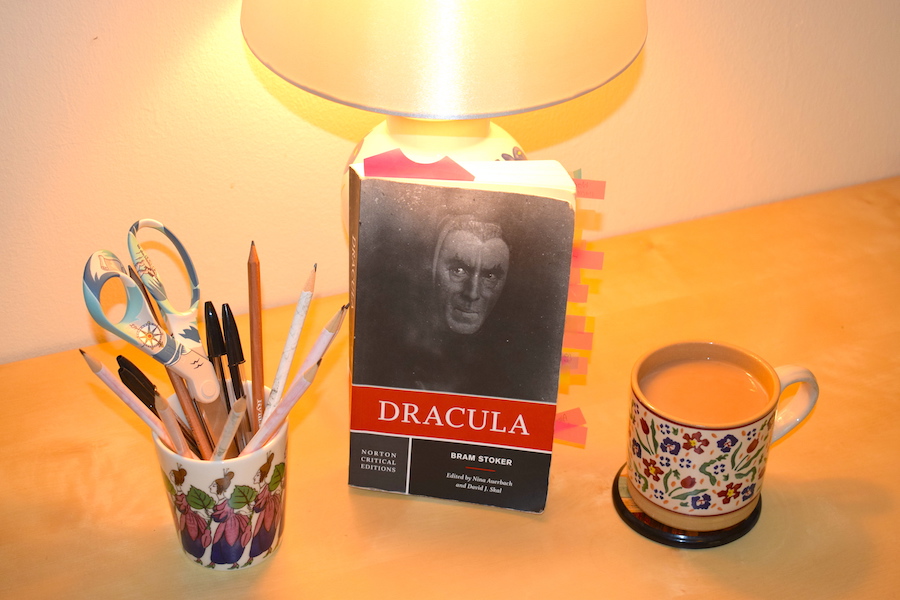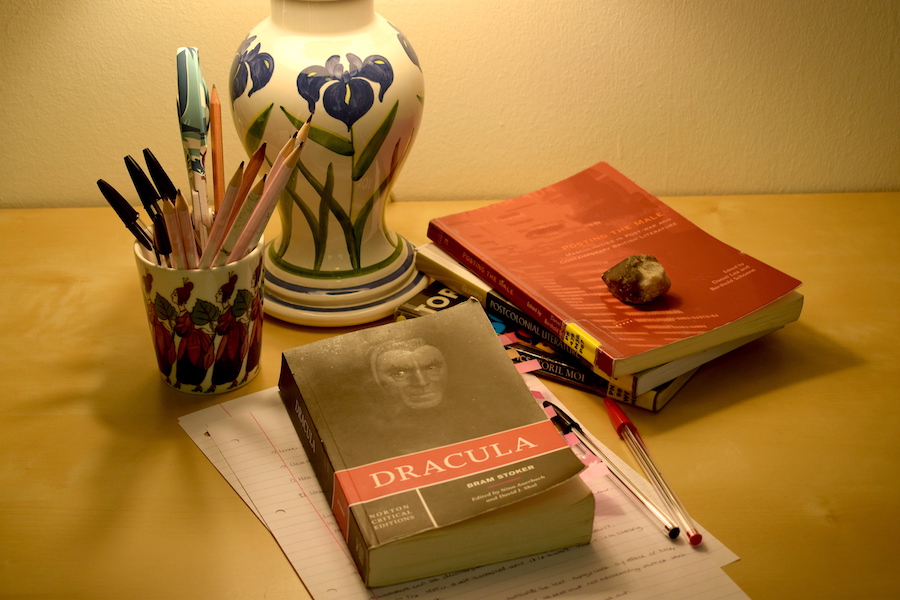Dracula
This post follows on from the previous first year uni reads post covering Persuasion, so give that a read if you haven’t already! Here I look at the second book we were encouraged to read for the prose module: Dracula, written by Bram Stoker in 1897.

An Overview
Dracula was far more popular with my seminar group. This was made particularly evident when the first assignment came round, and I found myself in the minority, choosing to focus on Persuasion for my formative assessment. Dracula was deemed to be interesting and thrilling, whilst Persuasion was largely considered dull.
Now, with my previous post I provided a brief summary of Persuasion, but I sense that the story of Dracula is far better known, so I’ll get to my review sooner. However, if you do want to get better acquainted with the tale without reading the novel, there are numerous films and summaries available to read and download or buy online.
So, let’s get down to the nitty gritty!

The Review
Dracula the novel quite frankly isn’t my cup of tea. I label it as the novel because I find the plot of Dracula, as retold in numerous film and theatre productions, far more enjoyable and appealing than the novel itself. Bram Stoker laid the foundations for a wonderful story, but the novel itself for me was a little dull. Don’t get me wrong, I can appreciate the appeal of the tale of Dracula, and have actually performed the part of Lucy in a school play, but the reading of this text was laborious.
Although the plot is shocking and exciting, the novel itself plods along at an alarmingly slow pace. I feel like this is due to the epistolary style adopted by Stoker, in which the narrative is told through many different mediums and narrators. He uses letters, diary entries, ship logbooks and newspaper articles to convey the storyline, which although all ordered chronologically, are at times confusing to follow, and incredibly slow in getting to the juicy parts of the tale.
I perfectly understand that this writing style was probably adopted to make the reader feel on edge and uncertain in the narrative, but I just don’t think it worked for this text. The switching and changing from location to location was intended to add interest, but just made me yearn for the plot to move forward. I admit that I perhaps am not the best judge of this genre as gothic horrors are never normally my first pick, but even so I really did give Dracula a fighting chance, and just didn’t feel wowed after reading it. Actually, I felt rather disappointed and deflated. I remember vividly the chore it was to pick up this novel, and the willpower it took to read it completely. I would have shelved this text if I wasn’t required to read it for my course.
Although this post may have an incredibly negative tone, and for a few may even be shocking to read, have no fear, it is not all doom and gloom! Though I may have very strong opinions on this text, others did too, and I have to say it really did make for interesting discussions in seminars. Moreover, Dracula is an ideal novel to study, because you can really explore and open up passages of it. For example, we had many discussions regarding the feminist dimensions of the novel, as well as numerous debates about Stoker’s choice to cast Count Dracula as a foreigner. To be honest, I probably should have written one of my assignments on this text because although I didn’t enjoy reading it, I loved studying it.
I can’t lie and say I loved this novel, because quite frankly I didn’t, but I’m equally not going to tell you to ‘keep away’ from it or say you won’t see the charm in it. For me, this novel wasn’t a masterpiece or the ideal read, but for others it was. That’s the wonderful thing about books, they have the ability to divide and unite people. What I can say with conviction about Dracula is that Stoker should be admired for creating such a wonderful plot and character that lives eternally in the memory of so many.
So, if you fancy giving this novel a read – do it! I think because I was so well acquainted with the plot of this novel before reading it, the magic of discovery was taken away slightly. If you don’t know the tale of Count Dracula, and his numerous victims and hunters, you will probably enjoy this novel far more than I did. Perhaps then this text falls victim to the film and stage, with their adaptations wooing me before I experienced the true origin of Dracula in Bram Stoker’s novel.

The Judgement
This is tricky. I loved studying this text, and I think the plot is genius, but what it boils down to is: “would I read it again?” and “would I encourage a friend to read it?”. The answer to both of these questions is no. Therefore, I would give it a . It feels rather mean to give a novel considered a classic text a such low rating, but if I had reviewed it without any input from course peers and discussions in seminars, the rating would have been far lower.
I hope you enjoyed reading this post. The next book review will be on the third text of this module, so keep your eyes peeled for it.
Lydia Signe x